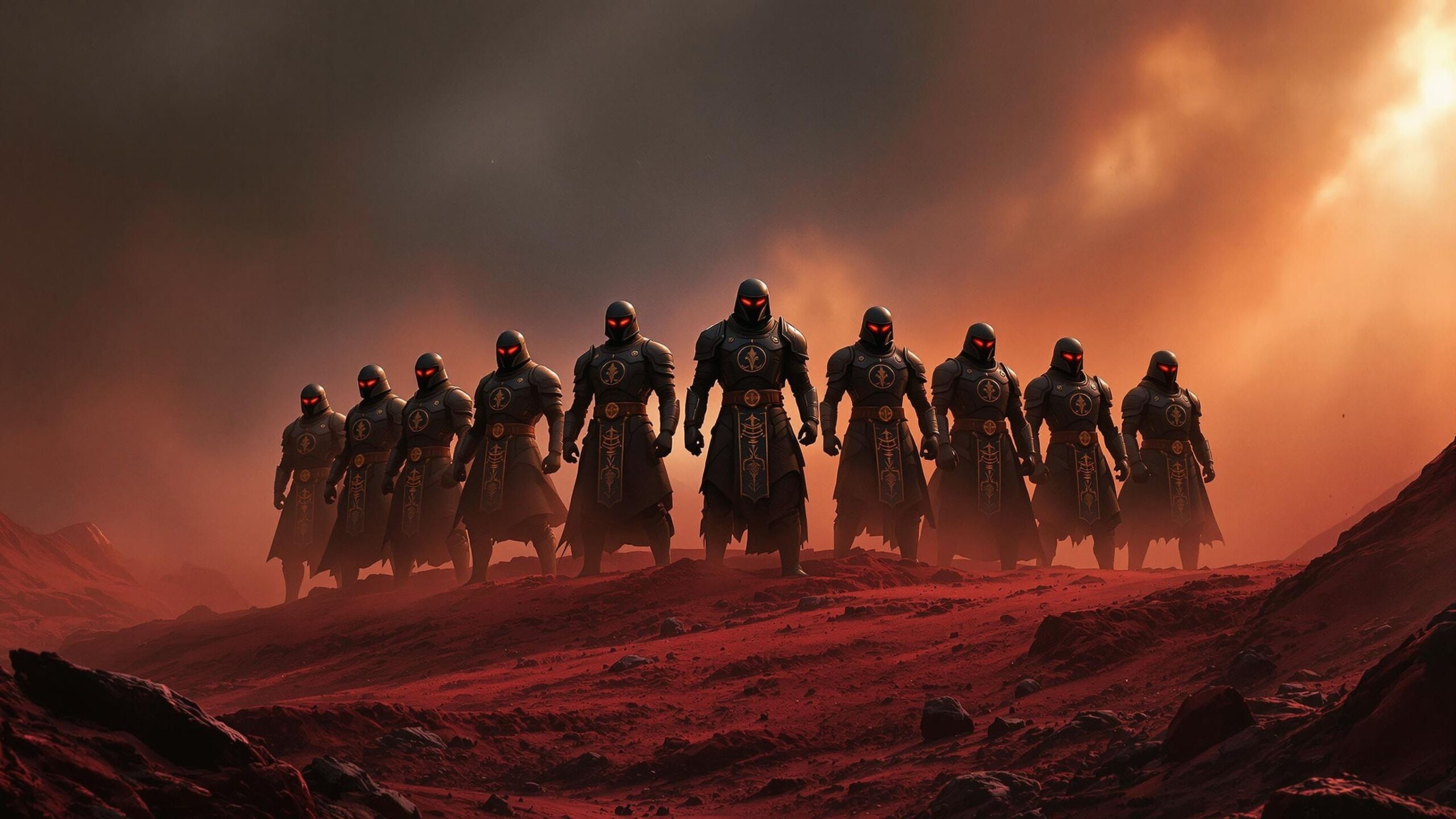The Sardaukar are the stuff of whispered legend and political nightmares in the Dune universe—an elite fighting force bred on the prison planet of Salusa Secundus, hardened by brutality, and loyal only to the Emperor. Clad in grey uniforms and trained to see death as a gift of honor, Sardaukar warriors were feared across the galaxy for their fanatical discipline, unmatched skill, and terrifying reputation. But within this brutal army, certain individuals stood out even more—soldiers, commanders, and assassins who left an unmistakable impact on the course of galactic events. Here are the ten most formidable Sardaukar warriors in Dune history, whose legacy of destruction, loyalty, and fear defined an era.
#10: Captain Aramsham
Though ultimately stationed on Arrakis under the brutal command of Glossu Rabban, Captain Aramsham’s early career was forged in the hellscape of Salusa Secundus, where only the cruelest and most cunning survived. Aramsham’s specialty was enforcing fear and loyalty within occupied territories, which made him a valuable asset when the Sardaukar were deployed as “advisors” and enforcers on behalf of the Harkonnens. Though not remembered for brilliance in strategy, Aramsham’s ruthless efficiency and unquestioning loyalty to Imperial orders made him a model Sardaukar officer—emotionless, obedient, and savage. His fate at the hands of the Fremen uprising marks a poetic justice, but not before he demonstrated just how dangerous even a mid-level Sardaukar could be when unleashed.
#9: Leron Halik
A name rarely mentioned outside of Dune appendices and fan lore, Leron Halik was infamous among Sardaukar battalions for leading a mutiny suppression campaign during a rebellion on a fringe world near the Rim. His ability to command loyalty under fire and use guerrilla tactics—ironically borrowed from Fremen strategies—made him a Sardaukar standout. Halik’s cold pragmatism, combined with a nearly religious adherence to Emperor Shaddam IV’s decrees, earned him rapid promotion. Halik was also instrumental in developing the psychological torture regimens that Sardaukar used against political prisoners. While not central to the main narrative, his influence on Sardaukar doctrine is undeniable. The ghosts of his methods lived on long after his death.
#8: Commander Yakob Zayal
Zayal is best remembered as one of the few Sardaukar officers who questioned the long-term use of terror as a governance tool—a rare moment of introspection within an otherwise merciless corp. However, his battlefield reputation was flawless. During the Zabul Rebellions, Zayal led a team of just fifty Sardaukar who suppressed an entire planetary resistance force numbering in the tens of thousands, using precision strikes and psychological warfare. He reportedly executed enemy generals using only blades, as a show of “Imperial mercy.” His icy demeanor and surgical ruthlessness made him one of the most feared commanders outside the Imperial Palace. Ultimately, his life ended in suspicious circumstances, likely ordered by the emperor himself after Zayal expressed concern about over-reliance on Sardaukar as tools of fear.
#7: Verrus Talik
One of the few Sardaukar assassins deployed within Landsraad Houses, Verrus Talik operated as a ghost, sent to destabilize internal House structures under orders from Shaddam IV. Talik’s genius lay in psychological warfare—he would impersonate nobles, plant incriminating evidence, and then disappear before blood was spilled. He was credited with ending at least six rival noble lines without firing a shot. The Bene Gesserit reportedly feared Talik for his ability to mimic Voice patterns and behaviors, a skill rare among Sardaukar. Though eventually captured by Atreides agents, Talik bit down on a poison capsule before he could be interrogated. His file remains classified within the Imperial Archives, marked simply with one word: “Effective.”
#6: Captain Rhombur Vex
A field commander and expert tactician, Rhombur Vex led one of the most successful Sardaukar campaigns during the Great Spice Tax Revolts, during which he conducted multiple off-world military operations to quell rebellion and maintain spice flow to the Empire. Vex’s strategy was elegant and terrifying—he would destabilize local governments by staging “civilian aid missions,” then initiate surgical strikes once trust had been gained. His ability to outthink his opponents set him apart from other Sardaukar officers who relied solely on brute force. Despite his achievements, Vex was reportedly executed for insubordination after criticizing the emperor’s alliance with the Harkonnens. Some historians suggest he may have faked his death and lived under a false identity, his skills too valuable to be discarded entirely.
#5: General Vinz Kael
A towering figure in Sardaukar history, Vinz Kael served as a personal military adviser to Shaddam IV and helped design the Salusan War Doctrine that defined Sardaukar combat tactics for decades. Known for his fierce loyalty and brutal effectiveness, Kael believed in breaking a population’s will before ever engaging in combat. He famously remarked, “Victory is won before the blade is drawn—by planting fear so deep that resistance feels like suicide.” Kael’s campaigns on Hagal and Bela Tegeuse were textbook examples of psychological dominance. He trained a generation of Sardaukar commanders in the art of total warfare, making him as much a force of philosophy as physical might. His death at the hands of a Fremen saboteur became symbolic of the turning tide against Sardaukar supremacy.
#4: Sardaukar Blade Adept Tammar Sek
Tammar Sek was a legend among Sardaukar swordsmen—a master of the blade whose duel training bordered on the ritualistic. Known for his involvement in ceremonial executions and “demonstration duels” staged for political impact, Sek was also a key trainer at the Imperial Sardaukar academies on Salusa Secundus. He viewed combat not just as warfare, but as psychological domination. He could reportedly parry projectile fire with his blade—a claim supported by fragmented training footage. Sek eventually led a black ops team meant to infiltrate Fremen sietches, but he vanished in the desert, his armor later found picked clean by sandtrout. Even in death, he became myth, a boogeyman the Fremen remembered and defeated.
#3: High Commander Jural Ennevar
Ennevar served directly under Emperor Elrood IX and was responsible for the expansion of Sardaukar presence in the deep zones of the Imperium. Ennevar’s campaigns were less flashy but incredibly effective—he crushed resistance before it could form. He employed spies, implanted agents, and ran complex loyalty drills that predated Mentat behavioral testing. He was also one of the few Sardaukar to maintain secret diplomatic connections to the Spacing Guild, using subtle leverage to ensure Sardaukar mobility. Ennevar’s doctrine of invisible control would later inspire Leto II’s covert empire management. His legacy was the art of silent suppression—crushing opposition before it knew it was being watched.
#2: Bashar Tyro Calon
Tyro Calon led the Sardaukar force deployed during the Arrakis betrayal in Dune and personally oversaw the invasion that led to the fall of House Atreides. His role was crucial in coordinating Harkonnen brutality with Sardaukar precision, masking Imperial involvement by disguising Sardaukar as Harkonnen troops. Calon was a military purist—he believed that the Sardaukar represented the soul of the Empire, and his disgust toward the Atreides was rooted in their popularity and perceived softness. Though ultimately defeated as the Fremen rose under Paul, Calon’s tactical brilliance delayed the Atreides resistance long enough for the Emperor to consolidate temporary power. His execution during the Fremen revolt was swift and symbolic—an end to the myth of Sardaukar invincibility.
#1: Sardaukar Commander Cammar Pilru
Of all the Sardaukar mentioned in official and apocryphal texts, Cammar Pilru stands as the ultimate embodiment of Sardaukar excellence and terror. A figure so legendary that children on fringe worlds were said to fear his name, Pilru was both a frontline commander and a mythic warrior. Known for leading the infamous Cleansing of Karolne’s Spine—a campaign where over 1.2 million rebels were extinguished within a week—Pilru believed in leaving no survivors, no symbols, and no hope. He was ruthless but brilliant, and even the Emperor reportedly feared giving him too much power. When Paul Atreides rose, Pilru was summoned to lead one final campaign against the Fremen but never made it to Arrakis. Rumors suggest he refused the order, claiming the desert did not fear Sardaukar—it devoured them. His disappearance marked the end of the old era, and his legacy became a cautionary tale of what happens when loyalty meets prophecy.
The Sardaukar were not merely an army—they were an institution of fear, forged in the crucible of Salusa Secundus and unleashed as instruments of the Emperor’s will. These ten warriors, each brutal and brilliant in their own right, defined what it meant to be Sardaukar. Whether through terrifying battlefield tactics, psychological domination, or precision infiltration, they elevated the corps from a feared military to a mythic force. Yet even their legacy, steeped in blood and victory, could not withstand the tides of prophecy and rebellion. The rise of the Fremen and the fall of Shaddam IV proved that even the most formidable warriors are not invincible. Still, their shadow lingers in every corner of the Dune universe—a grim reminder that the Sardaukar once ruled not by numbers, but by the fear they instilled with every step.




